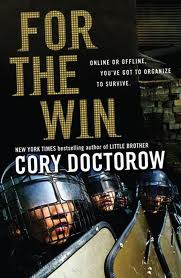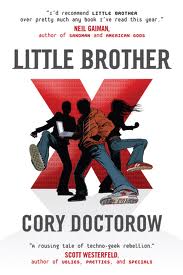When writing a novel, one common admonishment is to keep in mind the goal of entertaining the reader. Fiction’s purpose is to entertain; non-fiction’s purpose is to inform. But the lines between the two can often blur, as when non-fiction uses narrative techniques.
This week, I’ve been reading Cory Doctorow’s book, For the Win and he uses info dumps like crazy, putting in lots of technical discussions, potentially boring information. He does it–and it works? What is he doing right?

Story comes first. For the Win is first and foremost a wide-ranging global story of online gaming and how the workers across the world join together to fight for better working conditions. There’s a strong plot, strong goal and an interesting series of developments.
Interesting characters. Doctorow also pulls together a fascinating cast of characters, drawn from the four corners of the globe. There’s the uneducated, but smart Indian girl from the slums, a disillusioned teen from California, Worker activist from Singapore, determined striker from China, and equally fascinating radio personality from the Pearl Delta of China. They are all fleshed out with real-world needs, wants, goals, and their individual circumstances come alive.
Setting. For each character, their setting is particularized with specific sensory details. You get spicy chai and well-water in an Indian slum juxtaposed with the luxury of a wealthy California home.
In short, Doctorow tells a stirring, interesting tale.
But he goes a step farther. As long as he has your attention, he wants you to know something about the online gaming world. If you look at the top ten world economies, many of them are virtual worlds and economies of an online game. Sometimes, he stops and gives an info dump on economics, gaming rules, worker unions and so on. And sometimes, he has one character ask another to explain something.
For example, the Indian girl who is such a great gamer they call her General is uncertain about economics. She asks the college-graduate economist to explain something, then because the General dosen’t understand the complicated economics, the Economist explains further, in simpler terms.
It works. Really, it shouldn’t work, it’s an info dump and at that point of the novel, Doctorow is just trying to teach me–the reader–something about economics. (I am denser than the General sometimes!) And I don’t mind a bit. I keep reading. Because in the context of the exciting story, I don’t mind a bit of explanation, in fact, it adds to the enjoyment of the story, because I understand motivations and the worker’s dilemmas better. Doctorow makes me root for the worker’s revolution because I understand it better.
If I was just reading about economics, my eyes would glaze over. Reading this novel, though, I am fascinated and I try harder to understand. It matters because he’s made me like the General and hope that her life gets better.
 Likewise, if you need another example of how an info dump works well in a novel, read Doctorow’s book, Little Brother.
Likewise, if you need another example of how an info dump works well in a novel, read Doctorow’s book, Little Brother.
Go ahead: break the rules and give us an info dump in your novel. But please–tell a story first.
This is a great post. I suspect Doctorow’s info-dumps work because they teach about real world problems rather than a certain character’s backstory or generalized info. The book sounds fascinating, and you made me want to read it now! :-)
I found it necessary to stick an art history info-dump into the pursuit novel that I just sent off to my agent so that readers could understand just how much was at stake. It worked for a lot of my beta readers because it was in very much in character for this person to be lecturing and my protagonist felt worse and worse with every word.
Kristin: Great example of a necessary info-dump.
I think we rail against info-dumps because they aren’t always necessary.
Darcy
Lexa:
Doctorow’s info-dumps are about real world problems, even though, ironically, is about the virtual world of gaming. But I think you can do what he’s done here in other stories, too. It’s just a great example of how to do it well.
And yes, you will enjoy his writing!
Darcy
Thanks for this great post Darcy. Info dumping is always tricky territory. I agree about specific setting and strong characters. I’ve found it works to bring emotion in also, and to ask myself “why does the reader Want to know this Now?” It helps if the reader is hungry for the info or believes it might turn out to be vital in some way. We don’t want their eyes to glaze over. Yikes! Excuse any typos. I’m writing with my cat’s tail across the keyboasrd. She knows how to get my attention.
Janet:
Tricky territory, indeed. And you are right, if you can create an emotional need in the reader, then the info dump is easier to insert into a story.
Glad your feline helper agrees!
Darcy